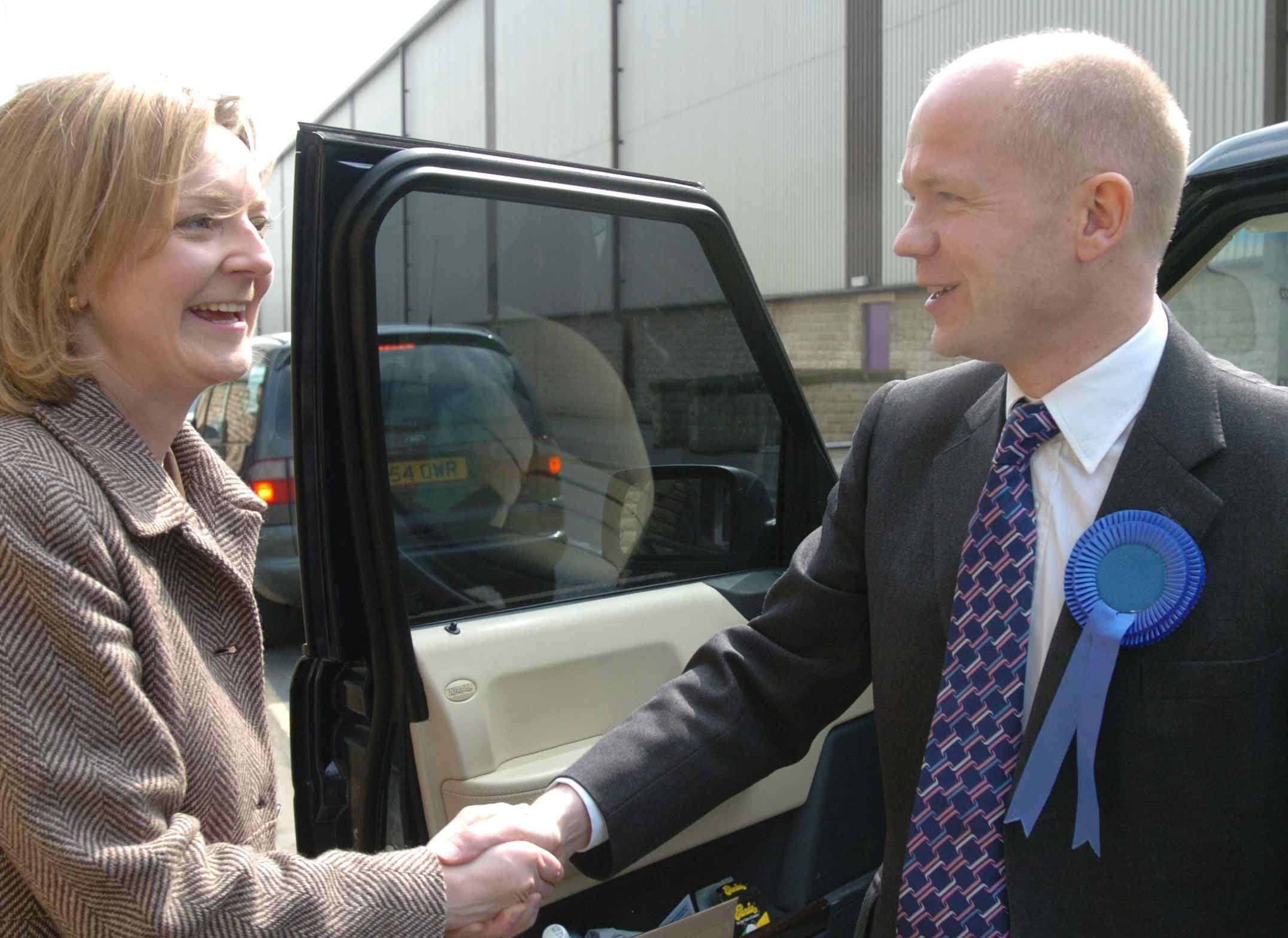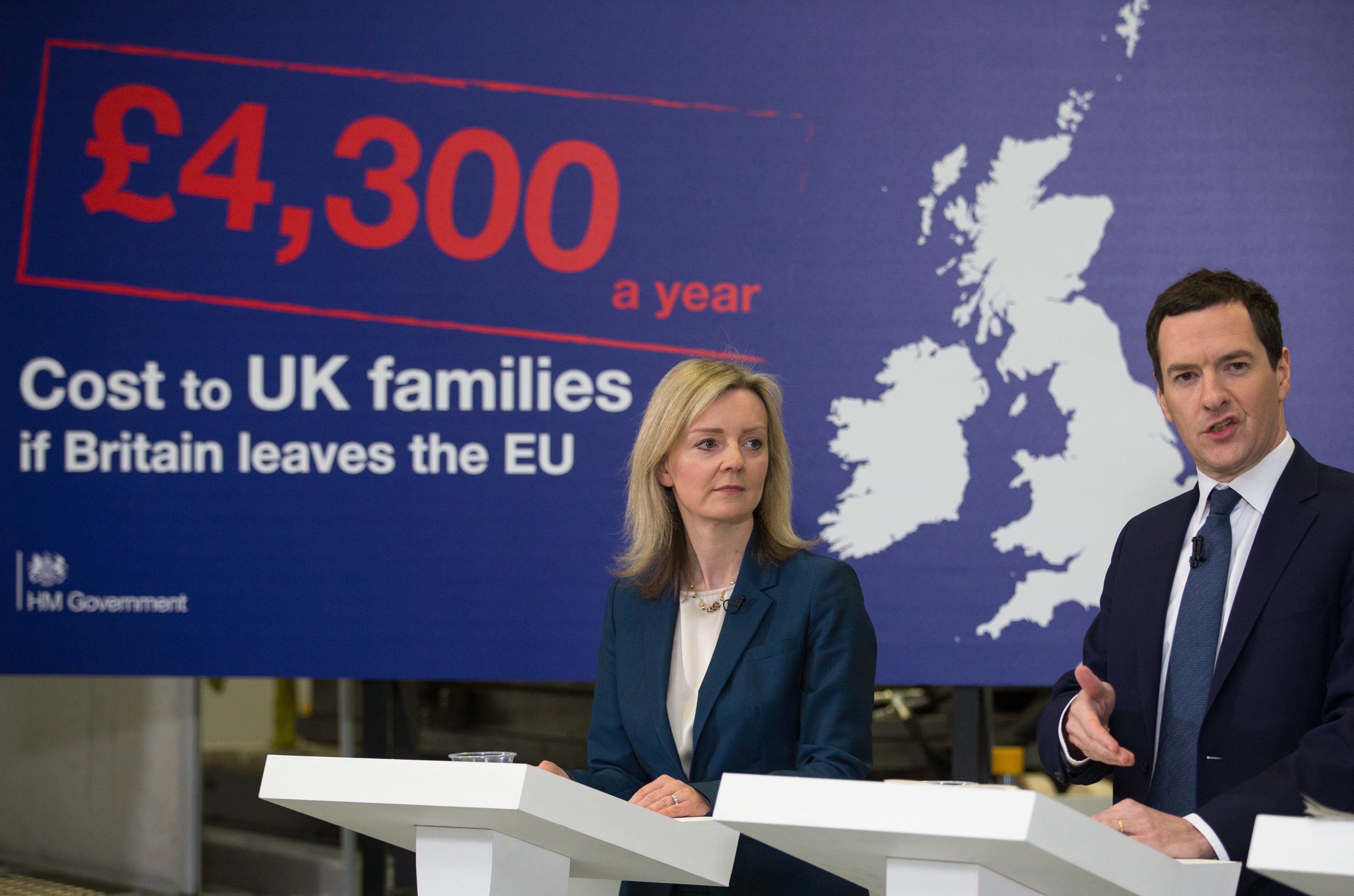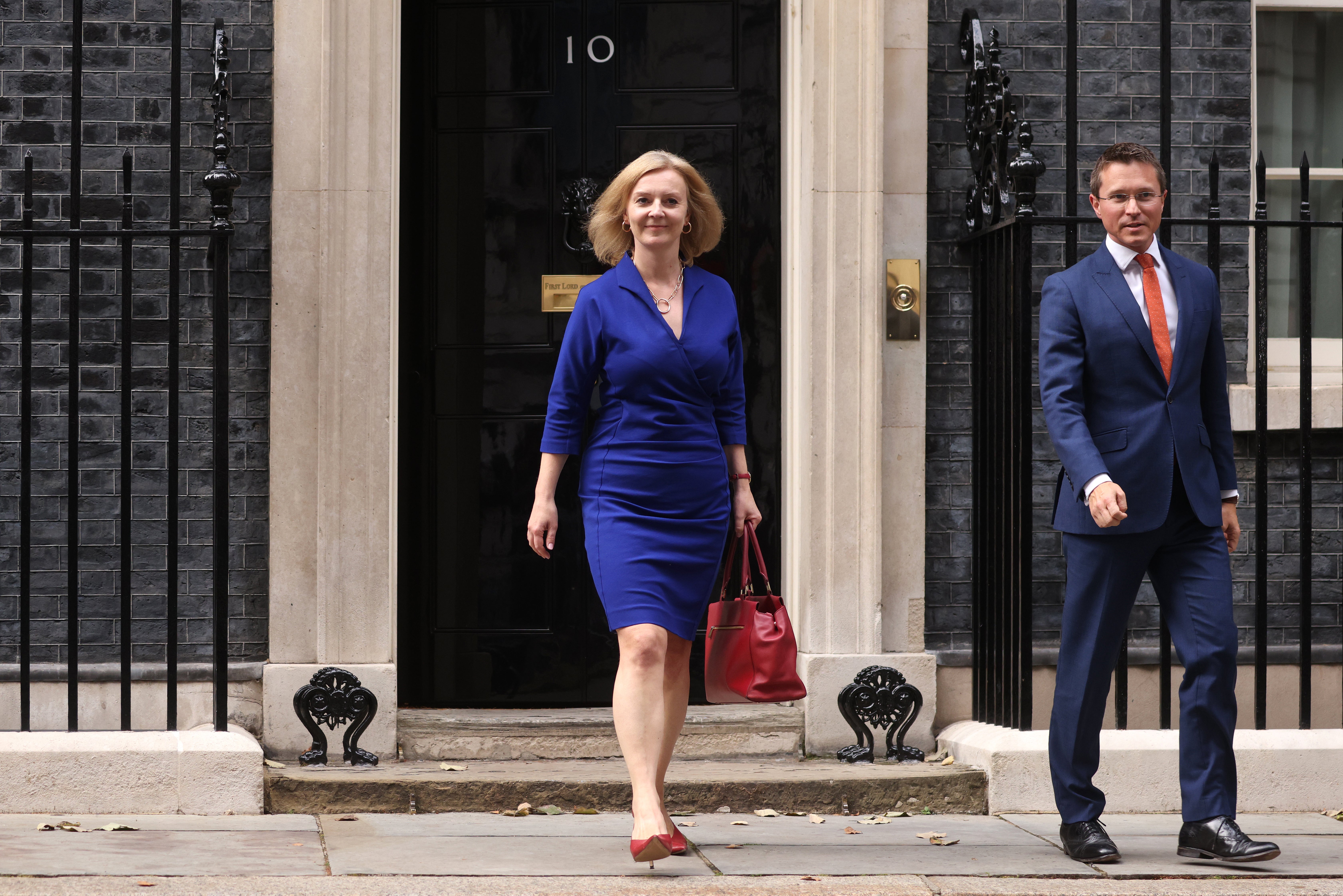Liz Truss: The Remain-backing former Lib Dem leading the way to succeed Boris Johnson
She’s adopted more political positions than most people have had hot dinners, yet Liz Truss stands as one of the most popular cabinet ministers among Tory grassroots. Ahead of the new foreign secretary’s conference speech on Sunday, Sean O’Grady looks at her meteoric rise


As the Tories head to Manchester for their conference (no vaccine passport required, but they’ll still need some petrol), Liz Truss is likely to be a very hot property for the delegates. She’s the one they’d most like to have a selfie with, the one they’ll squeeze into an undersized, overheated hotel conference room in order to listen to and, mayhap, she’s the one they’d really like to lead them into their Brexity shortage-ridden future. They have a saying, apparently – the cringeworthy “In Liz We Truss”. Ambitious beyond belief (albeit that her ambitions run far beyond her ability), she has time on her side, too – she turned 46 in July; she was the youngest female cabinet minister ever appointed, at 38, to the Defra role in 2014; she’s the first female foreign secretary – and she has only been in the Commons for 11 years. You have to give it to her: she has momentum. It could happen.
If Boris Johnson were suddenly toppled as leader of the Conservatives, there is a very strong possibility that he would be replaced by the Right Honourable Elizabeth Mary Truss MP, Her Majesty’s secretary of state for foreign, commonwealth and development affairs. There’s a sobering thought for you. In this not entirely fantastical scenario, and provided she got past the MPs stage and made it onto the ballot that goes out to the 160,000 or so members of the party (who might actually select our next prime minister), there is every chance she’d walk it, elbowing her only serious rival, Rishi Sunak, out of the way. They might respect Sunak for his brains, competence, easy manner and presentational skills, but he’s not much excited about statues, or waging war on wokery and being needlessly offensive to minorities. Liz is. It’s Liz who can give them an ideological orgasm. Just watch this week.
They are a fickle, unforgiving and demanding bunch, the Tory grassroots (as Theresa May and, more recently, Matt Hancock and Dominic Raab have discovered to their great cost), but right now Truss is topping the ConservativeHome popularity charts. Indeed, she’s been at or near the top of the cabinet league table for some time, having topped it first in December 2020. More than anything, this enthusiasm for her in the Conservative associations explains her recent promotion to high office and her emergence as a realistic successor to Johnson (who languishes, ominously for him, in the kind of spot usually reserved for Norwich or Newcastle in the Premier League table). As the ConservativeHome website puts it, “The freedom-orientated and ever-combative Truss is making the most of it.”
In many ways, Truss is the ultimate expression of the populist nationalism that has overtaken her party and overwhelmed the nation in recent years
Indeed so. It certainly wasn’t her meagre achievements as international trade secretary or environment secretary that got her to the top. She’s not always that agile in media interviews. No one who watched her trying to big up her free trade deal with Japan in the Commons, where she was humiliated by Emily Thornberry, could claim she was a natural parliamentary performer. One colleague likened her to “a robot with a bit missing”. She has a discordant, hesitant, off-putting speaking style, and a remarkably tin ear for the language. She can’t deliver a joke: instead she coins barbaric puns and cringeworthy quips. When she became trade secretary she used an office once occupied by Ian Fleming. Obviously she told her staff that “Liz Truss: licensed to trade” had arrived. God, her teams must wince.

Most famously, and embarrassingly, she made a much-ridiculed, passionate defence of British cheese, which still pulls in the ratings on YouTube, bolstered by her civil servants who, reportedly, declared “cheese time” when Liz was being especially intense, and would quietly mock her on their laptops. (If you’ve not yet seen it, it’s the one where she angrily decries the fact that two-thirds of the cheese sold in Britain is imported, as if she were talking about a war crime – “That. Is. A. Disgrace” – and the audience fails to react. It is calming viewing. With a typical lack of ironic awareness, she later explained that she was “hamming it up”).
She’s a paradox, and makes Boris Johnson appear a model of political constancy and fidelity
In many ways, Truss is the ultimate expression of the populist nationalism that has overtaken her party and overwhelmed the nation in recent years. This makes her the true heir to Johnson. Her popularity within the party – admittedly not yet mirrored in the country – derives most of all from her extreme partisanship, and her willingness to get stuck into what we’ve wearily come to know as the culture wars. Though she’s been courting the right since before she entered parliament, knocking out pound-shop versions of Thatcherism in pamphlets and at fringe meetings, it was a speech she made at the end of 2020 that propelled her into the stratosphere.
As part of her side-hustle as minister for women and equalities, the then trade secretary’s address, titled “The New Fight for Fairness”, was basically an exercise in gaslighting minorities and women, largely dismissing the notion that any kind of institutional or endemic discrimination stands in their way in Opportunity Britain. Cynically, she broadened the equality agenda to include white working-class voters in marginal seats in the north and Midlands, and presented equality as a zero-sum game.
It was all about equality of opportunity, not equality of outcomes. That is now the definition of “fairness”, leaving a lack of enterprise, or an unwillingness to work hard, as the only explanation for deprivation and poverty (and thus absolving the government of any obligation to redress inequalities of income and wealth). For progressives it makes for dispiriting reading, but it offers modern populist Conservatives a thin veneer of intellectual integrity and moral respectability for their prejudices, which is of course entirely the intention:
“We will not limit our fight for fairness to the nine protected characteristics laid out in the 2010 Equality Act, which include sex, race, and gender reassignment.
“While it is true people in these groups suffer discrimination, the focus on protected characteristics has led to a narrowing of the equality debate that overlooks socio-economic status and geographic inequality.
“This means some issues – particularly those facing white working-class children – are neglected.”
She said she was “calling time on ‘pink bus’ feminism, where women are left to fix sexism and campaign for childcare” – a sneering reference to equalities queen Harriet Harman’s campaign in the 2015 general election – and rejected (surprise, surprise) “virtue signalling”. A couple of years ago, Truss said: “I would describe myself as a Destiny’s Child feminist,” whatever that meant.

It is a striking feature of the present government that those in and around it who are the most viciously anti-woke are all female: Truss, Nadine Dorries, Priti Patel, Kemi Badenoch – and, inside No 10, policy chief Munira Mirza. It’s a crowded field, jostling to see who can insult and belittle the greatest number of drowning refugees, BBC journalists, hard-pressed teachers and female Labour MPs of colour in any given week, but Truss’s motivations seem to have a particular temperamental resentfulness about them.
Much of her career, for instance, seems to have been built on a series of reactions and rebellions – though that’s more a matter of style and habit, as she’s far from consistent in her views. Her parents are famously left-wing. Her dad, John Kenneth, an academic mathematician, is the more socialistic, but her mum – a nurse and a teacher – was the more politically active, taking the young Elizabeth on CND demos as a teenager and having her chant “Maggie, Maggie, Maggie, out, out, out” – or “oot, oot, oot”, perhaps, seeing as they lived in Paisley before moving to Leeds.
She jokes that her father prefers to think of her as a “sleeper” on a long-term secret mission to overturn the regime. In a way he’s right, I suppose, insofar as her only permanent principle is the establishment of a Truss regime in the UK. She sees herself as a “disrupter”; a “raucous” woman in a “raucous” country – someone who doesn’t like being told what to do. In an interview with Nick Robinson recorded in 2018, and presumably without having given much precise thought as to what might lie ahead for her at the FCDO, she said: “I don’t think anyone can describe me as a diplomat, Nick… and I’m not very diplomatic.” She certainly wasn’t when, as justice secretary, she refused to defend senior judges against a tabloid campaign of hate and personal abuse in which they were called “enemies of the people”. She says it’s OK to criticise them, but it also suited her not to be seen as an enemy of Paul Dacre and the Daily Mail.
Truss claims to have developed an early fascination with Margaret Thatcher, and once, aged 8, stood as a Mrs Thatcher candidate in a school election, on the premise of which she received no votes – even the little Liz voted against herself, an early sign of the contrary nature with which we have become familiar. She’s often compared to Mrs T, but then again so was Theresa May, so it’s just as well that Truss plays down the parallels: “I’m an economic liberal and social liberal… Margaret Thatcher was more a traditionalist.” In addition, Truss has few of Thatcher’s political and intellectual gifts, and none of her bravery or resolve – she is not so much Iron Lady as Cheese Lady.

Truss has in fact been on quite a political journey. By the time she got to Oxford to read PPE, she’d questioned her ancestral socialism and become a Liberal Democrat, complete with anti-monarchist sympathies. She says that studying economics was when “the penny dropped” for her, and she was a Tory by the time she was 22. Her drift rightward, she said, was also in part spurred by the teachers at her Leeds comprehensive.
Well-meaningly, they asked the pupils to write down what they thought of their lessons. Truss wrote that they were a “waste of time”: “There wasn’t enough focus on getting those students up to a basic level in English and maths. The biggest protection against unemployment is having a GCSE in maths. My view was that too much of the school was distracted (and not just the school – this was the attitude of the city council at the time). Too much of the school was distracted by fashionable subjects. We had lessons on racism, sexism... I could go on to the way we were taught history. It was episodic, rather than chronological.” Even so, Truss doesn’t seem to have done that badly from her parents’ decision to send her to the local comp rather than the grammar school.
When Truss joined the Tories in 1996, John Major’s party was falling to bits; perhaps she saw a longer-term prospect, or just believed in it. She worked in business for a while as a typical graduate (Shell, then Cable & Wireless, and qualifying as a management accountant), but she kept up her political ambitions. She got involved by standing in local politics, as a councillor in Lewisham, and stood for no-hope seats in no-hope general elections in 2001 and 2005 before getting herself onto David Cameron’s A-list of candidates and winning the nomination for the solid seat of South West Norfolk.
She said she looked forward to beating Labour (not an onerous task in those parts), although she did nearly lose the seat to the “Turnip Taliban”. After she was selected, or parachuted in according to her enemies, some in this rural constituency were severely miffed when it emerged that the married Truss had had an affair with a Tory MP, Mark Field, who was also married. Field had been allocated to the high-flying Truss as a “mentor”, but, as one senior Tory of the time later told the press, “It seems Field took his mentoring duties more seriously than was intended.” Field’s 12-year marriage ended, but Truss’s marriage to Hugh O’Leary (from 2000) survived. She has two teenage daughters, Frances and Liberty.
Part of the outrage expressed by the “Turnip Taliban” was about morality; some was dressed up as upset that she’d not told them about her private life; and the rest was probably just misogyny. In any case, she mashed the turnips, avoided deselection, and as soon as she got into the Commons she set about making friends and putting herself about. With Kwasi Kwarteng, Dominic Raab and Priti Patel, she co-authored the notorious performative broadside “Britannia Unchained”, which contained the line about the British being “among the worst idlers in the world”. She enjoyed working under Michael Gove (“I’m a huge admirer”) in her first ministerial position at the Department for Education (2012-14), and she’s been in government ever since – the only member of the cabinet with continuous service since the Cameron era.
She’s managed to survive the last turbulent decade by tempering her self-proclaimed Thatcherite, libertarian, rightist beliefs to the fashions of the times and the outlook of the leadership of the day. Nowhere is this more apparent than on Brexit. No doubt with one eye on what seemed like the most likely result, and thus best for her future, Truss was loyal to Cameron and backed Remain in the 2016 referendum. The future foreign secretary stated at the time: “When you are speaking for 500 million people, that really carries weight.” No doubt, as a former trade secretary, she’d also like to unsay her remark that “as part of the single market, we do not face the tariffs and barriers that we face in trying to export to other countries. That is vital for our farming industry.” In 2018 she explained her conversion to the Brexit cause on the grounds that the predicted economic disaster hadn’t materialised, though of course the UK was still inside the EU at that point.

At that point, as chief secretary to the Treasury, she was backing Theresa May’s Brexit deal, the Chequers Agreement, which bound the UK to a “common rule book” with the EU; she did not follow the examples of David Davis, Dominic Raab and Boris Johnson in quitting May’s government. She wanted a soft Brexit, and stuck with it, yet she is now happiest among the most hardline Eurosceptic elements of the party, and it’s not that hard to work out why. She was the first senior minister to back Boris Johnson in 2019.
Another example of her rubbery principles: a few years ago Truss made a speech that poked fun at Gove’s green-tinged nannyish tendencies at the Department for Environment, Food and Rural Affairs (where he has succeeded her) and elsewhere – “Too often we’re hearing about not drinking too much, eating too many doughnuts ... and enjoying the warm glow of our wood-burning Goves, I mean stoves.” Yet she has sat in governments that have taxed fizzy drinks and imposed tougher and tougher CO2 targets. When she was a Treasury minister, she told her colleagues that there was “nothing macho” about demanding more money for their departments; now she is in the most free-spending, high-taxing, debt-loading administration (even allowing for Covid) in half a century. You doubt she minds the fiscal incontinence all that much as she sits in her palatial office.
We know that Liz Truss is cheesy, in more ways than one. We know that she has variously been – or posed as – a Liberal Democrat, a social liberal, an economic liberal, a libertarian, a disrupter (as recently as 2019 she proposed building a million homes on the London green belt), a Remainer, a Brexiteer, a Cameroon, a Johnsonian populist, an equalities minister who doesn’t want an equal society, a feminist who doesn’t like positive action or quotas, a justice secretary who disdains the legal establishment, a trade secretary who didn’t do any groundbreaking deals… and so on. She’s a paradox, to put it politely, and makes Boris Johnson appear a model of political constancy and fidelity.
More than most politicians, and just like Johnson, the thing she most believes in is herself. Liz Truss is indeed the most fitting possible tribute, monument and successor to the Johnson way of political life.



Join our commenting forum
Join thought-provoking conversations, follow other Independent readers and see their replies
Comments